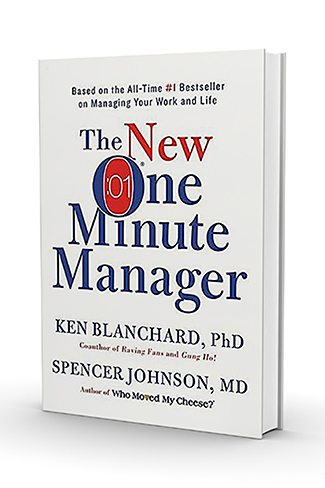Leadership Tips From The One Minute Manager

There are countless books out there offering advice and information relevant to our business, and some of them are real gems. This is the first in a series of profiles in PPAI Magazine on the books that should be in every promo professional’s library, starting with Kenneth Blanchard and Spencer Johnson’s The One Minute Manager.
 Title: The One Minute Manager
Title: The One Minute Manager
Authors: Kenneth Blanchard and Spencer Johnson
Why I chose this book:
This book was one of the classics that was included in the curriculum with my undergrad management course. It is a quick read and told in an anecdotal style, which gives it some whimsy. I debated on starting with this or the One Minute Salesperson, but decided the management side needed some highlighting.
The book has been updated since my copy, the 1984 edition, but the concept is still the same. It also was a delightful trip down memory lane for me, comparing what I highlighted while reading this at age 20 versus me reading it now, with management experience. Some of it didn’t age well, like telling the “young man” to look up a number in the phone book, but the base message is still relevant.
I recommend it for:
Anyone in a management position or aspiring to be in one.
Key points:
“How on Earth can I get results if it’s not through people? I care about people and results. They go hand in hand.” We get so caught up in the results that we forget to nurture our human capital. This book gave some great suggestions on how to do that in a “one-minute” style.
One of the key points that really stood out to me was how the One Minute Manager character pushed the “young man” to make simple decisions rather than rely on the manager to make them for him. Younger me would have struggled with this, but it is true. If you empower your team and provide them with the resources to make decisions, you will be more efficient as a manager.
I also love the idea of 250-word goals. Even though I can get wordy, if you can’t fit it in 250 words, No. 1, your manager might not have time to read it, and No. 2, it is too complex and should be broken up.
“Catch you doing something right” is another great idea. In many levels of an organization, the focus can be on the negative: What is missing, or what are your employees doing wrong? Shifting focus to find things they are doing right and to mention them – without sandwiching them together with something they are doing wrong – can be such an effective way to motivate team members. Even if you are putting out fires in every other group, make sure to praise those who are doing well.
“Most companies spend 50% to 70% of their money on people’s salaries. And yet, they spend less than 1% of their budget to train people.” Whether this is still accurate or not, it’s a great point. We spend money to acquire and retain employees, but do we spend time investing in their growth and making sure they have the tools they need? How often do we rely on throwing people into the fire and figuring it out, which sometimes we have to, rather than making sure they have the resources to be successful?
This is why we are putting such a focus on professional development at PPAI. Are we giving the community the training they need to develop at all levels? We will be.

“I believe most managers know what they want their people to do. They just don’t bother to tell their people in a way they would understand. They assume they should know.” Well, we all know what happens when you assume. But this is an excellent point. Does your team know, in no uncertain terms, what the goal is and what their role is in accomplishing it? Are you meeting them on their terms?
There is nothing more frustrating as an employee than working for a manager who has a preconceived idea of how something is going to happen or work but that idea is not communicated. It is the manager’s job to make sure that it is clearly communicated and on their employees’ communication level.
“Their behavior is not OK. They are OK.” This is such a good reminder. When employees feel they are being attacked, they tend to jump on the defensive and may not actually listen to the feedback being presented. And remembering as a manager to own your own mistakes goes a long way. Giving yourself a “one-minute reprimand” shows you practice what you preach.
My takeaway:
I really enjoyed this book and rereading it with newfound experiences and perspective. Having dealt with a variety of management styles made this resonate even more, I was able to reflect on the points and really understand the message with actual experience to rely on.
I especially liked the reminder of the one-minute goals and plan on adding that to my weekly one-on-one with my manager. This is absolutely something I would still recommend to others so they can learn about the One Minute Manager style.
Gibbons-Rauch is PPAI’s manager of professional development, learning programs.

